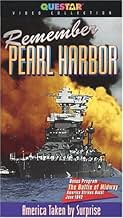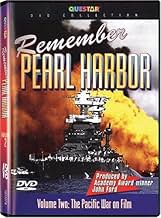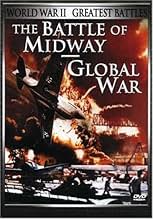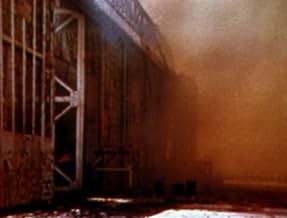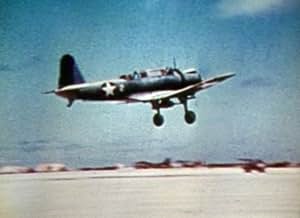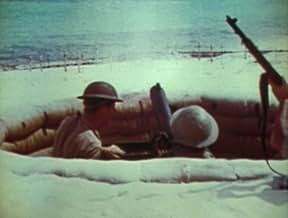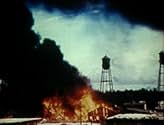NOTE IMDb
6,1/10
2,4 k
MA NOTE
Ajouter une intrigue dans votre langueThe Japanese attack on Midway in June 1942, filmed as it happened.The Japanese attack on Midway in June 1942, filmed as it happened.The Japanese attack on Midway in June 1942, filmed as it happened.
- Réalisation
- Scénario
- Casting principal
- Récompensé par 1 Oscar
- 1 victoire au total
Henry Fonda
- Narrator
- (voix)
Jane Darwell
- Narrator
- (voix)
James Roosevelt
- Self - US Army Major
- (as Major Roosevelt)
Donald Crisp
- Main Narrator
- (voix)
- (non crédité)
Irving Pichel
- Narrator
- (voix)
- (non crédité)
Jimmie Thach
- Self - Naval Aviator
- (non crédité)
Avis à la une
Battle of Midway, The (1942)
*** (out of 4)
Henry Fonda and Donald Crisp add narration to the battle scenes shot by John Ford where the director was even wounded by enemy fire. There's really no story being told in this documentary but instead we just see a part of history in beautiful Technicolor. God knows everyone has seen countless war films but there's something unique seeing real ones here. They certainly look a lot different than what we've seen in countless fake movies.
Ford's World War 2 shorts are out there in various forms ranging from public domain companies to the Ford at Fox set. Quality various but the version in the Fox set is the best.
*** (out of 4)
Henry Fonda and Donald Crisp add narration to the battle scenes shot by John Ford where the director was even wounded by enemy fire. There's really no story being told in this documentary but instead we just see a part of history in beautiful Technicolor. God knows everyone has seen countless war films but there's something unique seeing real ones here. They certainly look a lot different than what we've seen in countless fake movies.
Ford's World War 2 shorts are out there in various forms ranging from public domain companies to the Ford at Fox set. Quality various but the version in the Fox set is the best.
This short piece of film shows parts of, as the title already tells us, of the battle of Midway, and some moments after it. The director is John Ford and what he creates with this short documentary is pure Hollywood war propaganda. There is a storyline that even includes the women at home waiting for the fighters. During some scenes a dialogue between Jane Darwell and the great Henry Fonda is heard on the background.
The images of the battle, shot in color, have historic value and are pretty exciting. The heroic tone is easy to understand, although now it is easy to see past that. Everything, including its Oscar win, seems to be there for propaganda purposes, making the people at home feel good enough about the war that is going on. In the end 'The Battle of Midway' is an interesting little film, but not that much more.
The images of the battle, shot in color, have historic value and are pretty exciting. The heroic tone is easy to understand, although now it is easy to see past that. Everything, including its Oscar win, seems to be there for propaganda purposes, making the people at home feel good enough about the war that is going on. In the end 'The Battle of Midway' is an interesting little film, but not that much more.
This is a great, short (less than 20 minutes)film of one part of the key battle of the war in the Pacific. Keep it mind, the Battle of Midway was fought in early June, 1942. The darkest days of the Pacific War for America. Pearl Harbor, the Phillipines, Bataan, Corregidor, Wake Island; all American defeats. It is, indeed, a "propaganda" film. Or, at least it was turned into one after John Ford shot it. But the film of the combat itself is no propaganda piece. It took a lot of courage for Ford to stick his cameras out and film while hundreds of Japanese planes struck the island. Many Marines died in the bombing. Ford could easily have been killed. Of necessity, Ford could only film the land portion of the battle, which was an attempt by Japanese naval forces to reduce the island's defenses and then conduct a landing, possibly eventually putting Hawaii in jeopardy with a new, forward Japanese base on Midway. The major part of the battle was a naval battle between carrier forces. An "incredible victory" in the title of the Walter Lord book. Four Japanese aircraft carriers, miles from the filming on Midway itself, were sunk. It was the begging of the end of Japan. The stiff resistance put up by the Marines on Midway, captured by Ford, forced decisions by the Japanese High Command that ultimately led to the sinking of their carriers. Historically interesting film.
John Ford's celebrated 19-minute documentary about America's first major victory of World War Two earned him a shrapnel wound, a Purple Heart and an Oscar. The first 10 is impressive without being that interesting - hard-won battle footage that largely consists of some stuff setting on fire, the camera shaking, the film cutting, then something else setting on fire - though the raising of the flag is a lovely moment, narrator Irving Pichel intoning: "Yes, this really happened". The second half is more obviously Fordian, the elegiac tone reinforced by hymns, slanting shadows and Jane Darwell's frenzied, corny, but effective narration. Audiences wept and fainted during the passage where she urges ambulance-men to rush injured soldiers to a hospital. Ford would make his definitive statement on the war, and the nature of heroism, with 1945's They Were Expendable, but this short is well worth a look.
"The Battle of Midway" is an important historical film. Imagine...film crews were on the island when it was attacked and soon after rushed this short into theaters to celebrate this HUGE American victory. So, from a historical viewpoint it is an important film. BUT, and there is a but here, seen today the film isn't the wonderful film it was proclaimed to be when it was given an Oscar in 1943. I really think the Oscar purely came because of patriotism--Hollywood's attempt to bolster the war effort by heaping praise and awards on films that drummed up love of country and the war. Seen today, the color print is very faded and scratchy but more importantly the narrative sucks. The film was shot with color but was silent--and all sound effects and narration were added later-- and some of the voiceovers were terrible.
The bottom line is that if you want to see a historical document-- see this. If you want to see a good film that explains the battle well, don't! There are much better documentaries on the battle.
The bottom line is that if you want to see a historical document-- see this. If you want to see a good film that explains the battle well, don't! There are much better documentaries on the battle.
Le saviez-vous
- AnecdotesDirector John Ford and cinematographer Joseph H. August were wounded by enemy fire while filming the battle.
- Citations
Main Narrator: Midway Island. Not much land right enough, but it's our outpost. Your front yard.
- ConnexionsEdited into Ils ont filmé la guerre en couleur (2000)
- Bandes originalesAmerica, My Country Tis of Thee
(1832) (uncredited)
Music by Lowell Mason, based on the Music by Henry Carey from "God Save the King" (1744)
Words by Samuel F. Smith
Played in the score and later sung by an offscreen chorus
Meilleurs choix
Connectez-vous pour évaluer et suivre la liste de favoris afin de recevoir des recommandations personnalisées
Détails
- Durée18 minutes
- Mixage
- Rapport de forme
- 1.37 : 1
Contribuer à cette page
Suggérer une modification ou ajouter du contenu manquant



